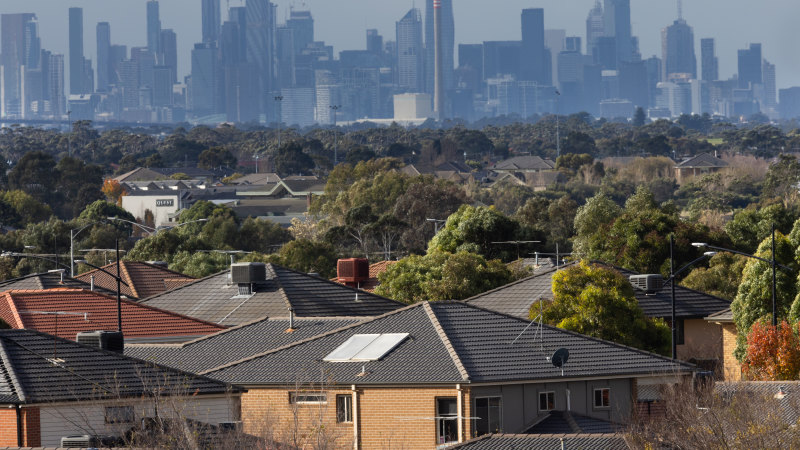Save articles for later
Add articles to your saved list and come back to them any time.
The nation’s property market has turned despite the risk of another interest rate increase, with home values climbing for the second month in a row.
The rebound will fuel a political debate about how to tackle housing affordability, as Greens continue to block Labor’s signature $10 billion future fund policy to finance new homes and demand federal intervention to freeze interest rates and rents.
The nation’s property market has turned despite the risk of another interest rate increase, with home values climbing for the second month in a row.Credit: Jason South
Australian home values rose by 0.5 per cent in April, according to CoreLogic’s home value index, building on a 0.6 per cent increase in March, with the Sydney property market leading the turnaround.
Houses in Sydney grew in value by 1.3 per cent last month and by 0.2 per cent in Melbourne, with every capital city except Canberra and Darwin recording a bounce.
As focus intensifies on the government’s plans to provide cost of living relief in next week’s budget, Finance Minister Katy Gallagher attacked the Greens’ calls for immediate federal intervention to deliver relief to renters and homeowners.
“We won’t and don’t take economic advice from the Greens political party,” Gallagher said on Sunday.
Finance Minister Katy Gallagher said Labor won’t be taking economic advice from the Greens.Credit: Alex Ellinghausen
“If the Greens think you can wave a magic wand or snap your finger and solve some of these deeply entrenched issues across a number of governments right around Australia, they’re wrong.”
She pointed to the agreement struck at national cabinet on Friday for the Commonwealth to work with states and territories on harmonising protections for renters across the nation, and the federal governments pledge for a $2 billion increase in support for social and affordable housing in the budget.
The Greens are digging in against the government’s $10 billion Housing Australia Future Fund, which is currently stuck in the Senate, with leader Adam Bandt calling it a “gamble” and arguing instead for direct investment in social and affordable housing as the party prepares to introduce a bill to freeze interest rates and rents.
On Sunday, the federal government announced it would expand the eligibility for its Home Guarantee Scheme beyond couples and single applicants, but there is no overall increase in the scheme, which is limited to 50,000 loans annually.
The expanded eligibility for the scheme, under which the federal government acts as guarantor so buyers with a deposit as low as 5 per cent avoid paying lenders mortgage insurance, allows for joint applications by friends, siblings, and other family members, as well as non-first home buyers who haven’t owned a property for a decade.
CoreLogic research director Tim Lawless said the latest home value figures indicated Australia was emerging from a short but sharp downturn where the value of dwellings in capital cities plummeted 9.7 per cent from April 2022 to February 2023.
“Typically, we wouldn’t see housing values start a new growth cycle until monetary policy started to ease, credit policies loosened or some level of fiscal support was introduced. The shift towards more positive conditions has come about in the absence of these factors,” Lawless said.
“The key drivers of this positive inflection seem to be the larger than expected rise in net overseas migration which has created additional housing demand at a time of extremely tight rental conditions and well below average levels of advertised supply.”
On Tuesday, the Reserve Bank board will meet to make a line ball decision on whether to increase interest rates or hold them after lifting the official cash rate from 0.1 per cent to 3.6 per cent in less than a year.
It will be the RBA board’s first meeting since a consequential independent review of the bank, which will see the board stripped of its power to set interest rates and the decision handed to a specialist monetary policy committee to be established within the bank.
The board paused interest rate rises last month for the first meeting since last May, amid global financial instability and a slowing economic outlook.
The latest inflation figures from the Australian Bureau of Statistics confirm the worst cost of living pressures are behind the economy, falling from 7.8 per cent over the year to December to 7 per cent in the year to March.
Despite easing inflation, consumers are pulling back on spending, particularly for non-essentials, according to recent research from Visa.
Separate research from NAB showed more than four in 10 Australians experienced some form of financial hardship in the first three months of the year, the highest rate in six years.
One in four of the people who experienced hardship missed a payment for a bill. One in 20 missed a mortgage payment.
Economists are split on whether the Reserve Bank will lift or hold interest rates. Of the four major banks, only Commonwealth expects the board to opt for an increase in the official cash rate of a quarter of a percentage point. Both Westpac and NAB believe the current 3.6 per cent is the peak of interest rates, while ANZ expects the bank to hike once more later in the year.
Cut through the noise of federal politics with news, views and expert analysis from Jacqueline Maley. Subscribers can sign up to our weekly Inside Politics newsletter here.
Most Viewed in Politics
From our partners
Source: Read Full Article


